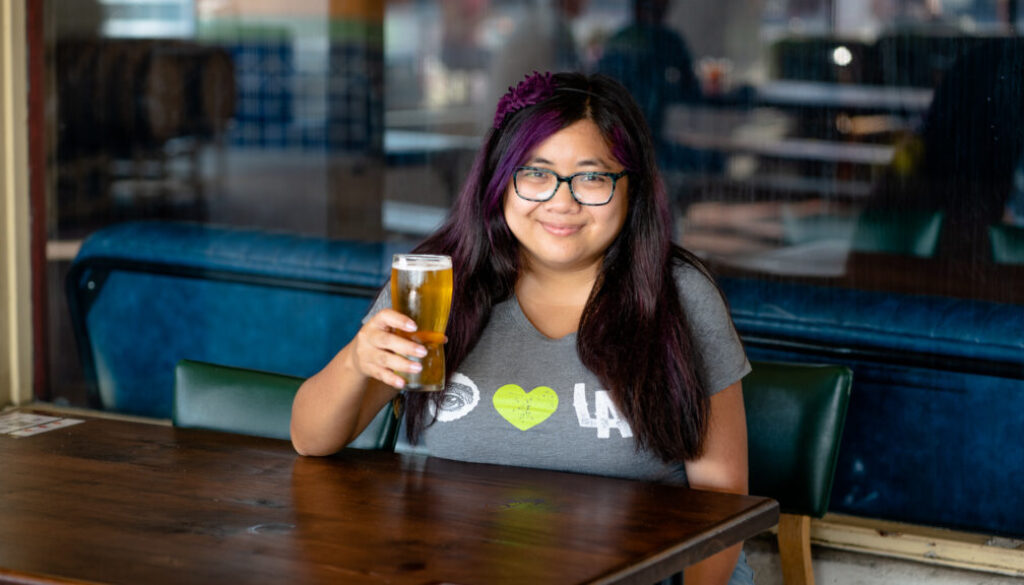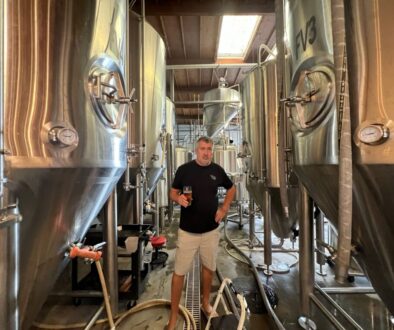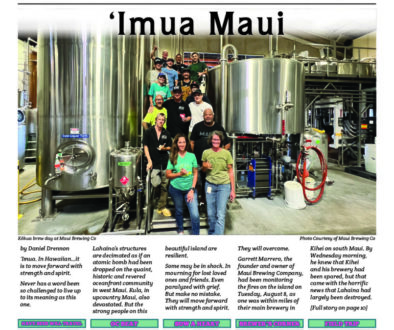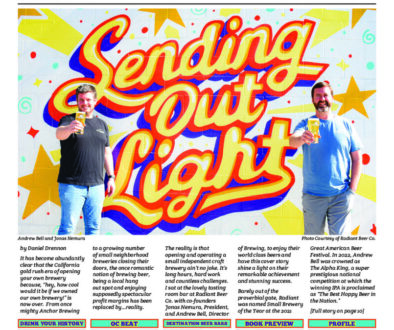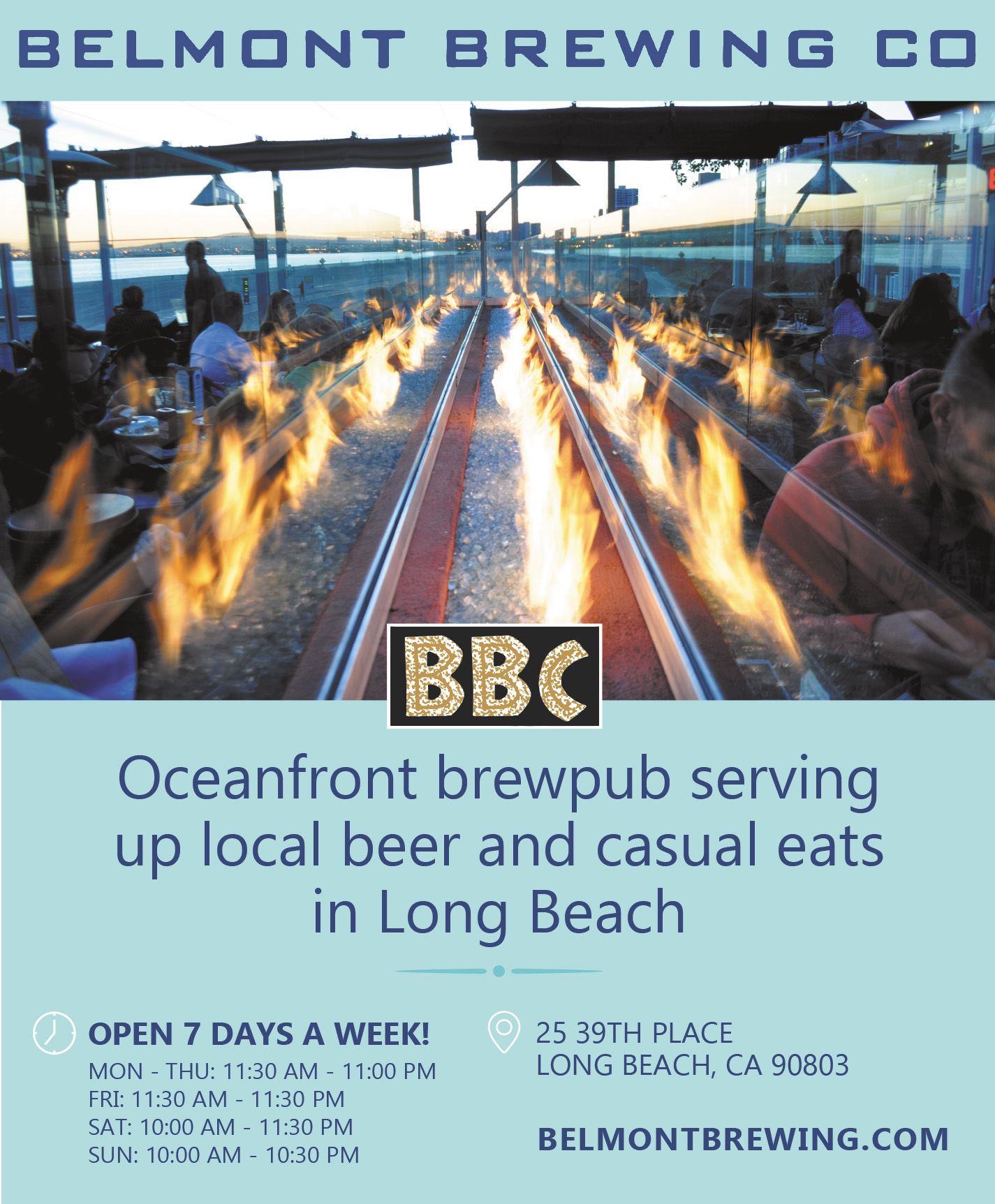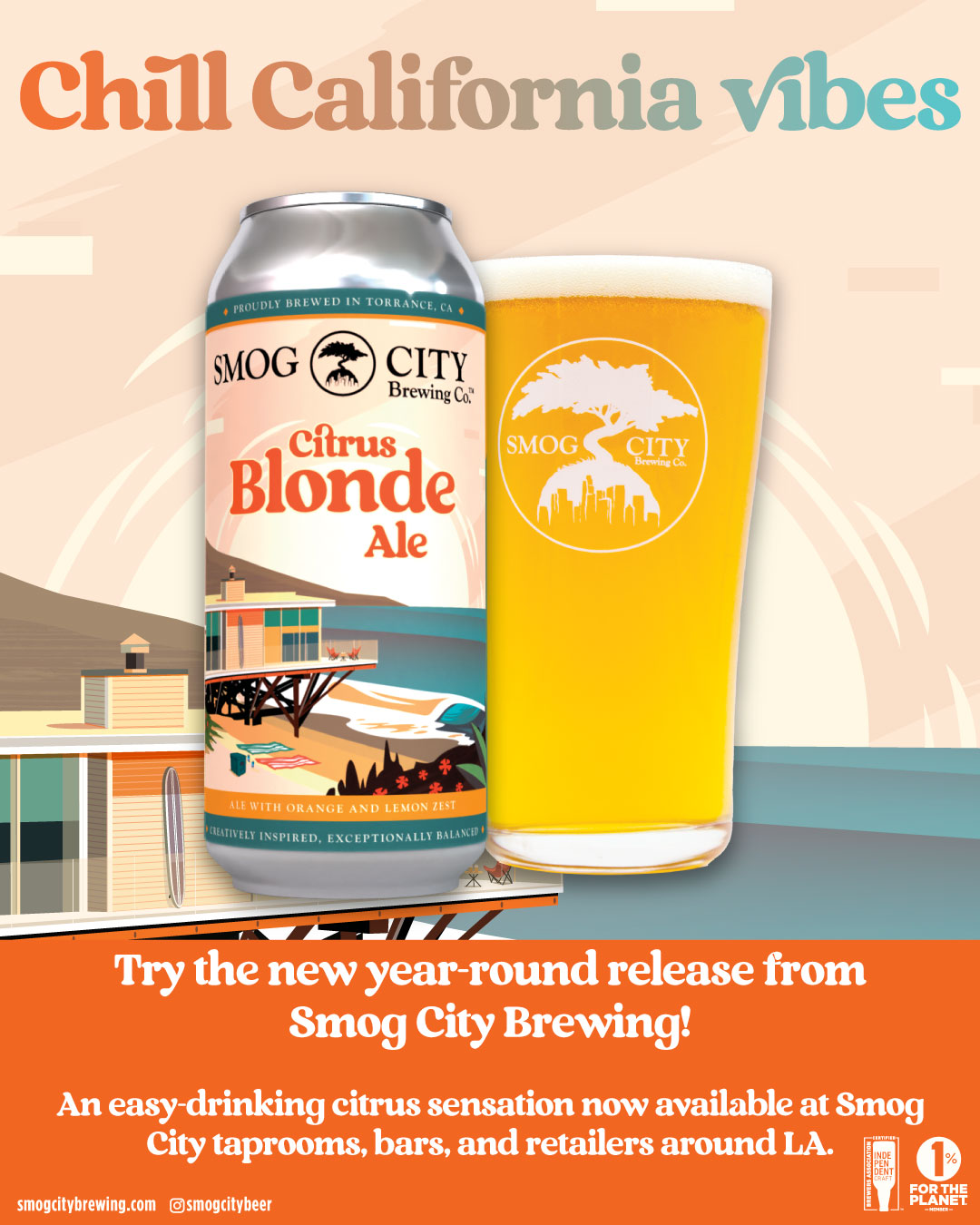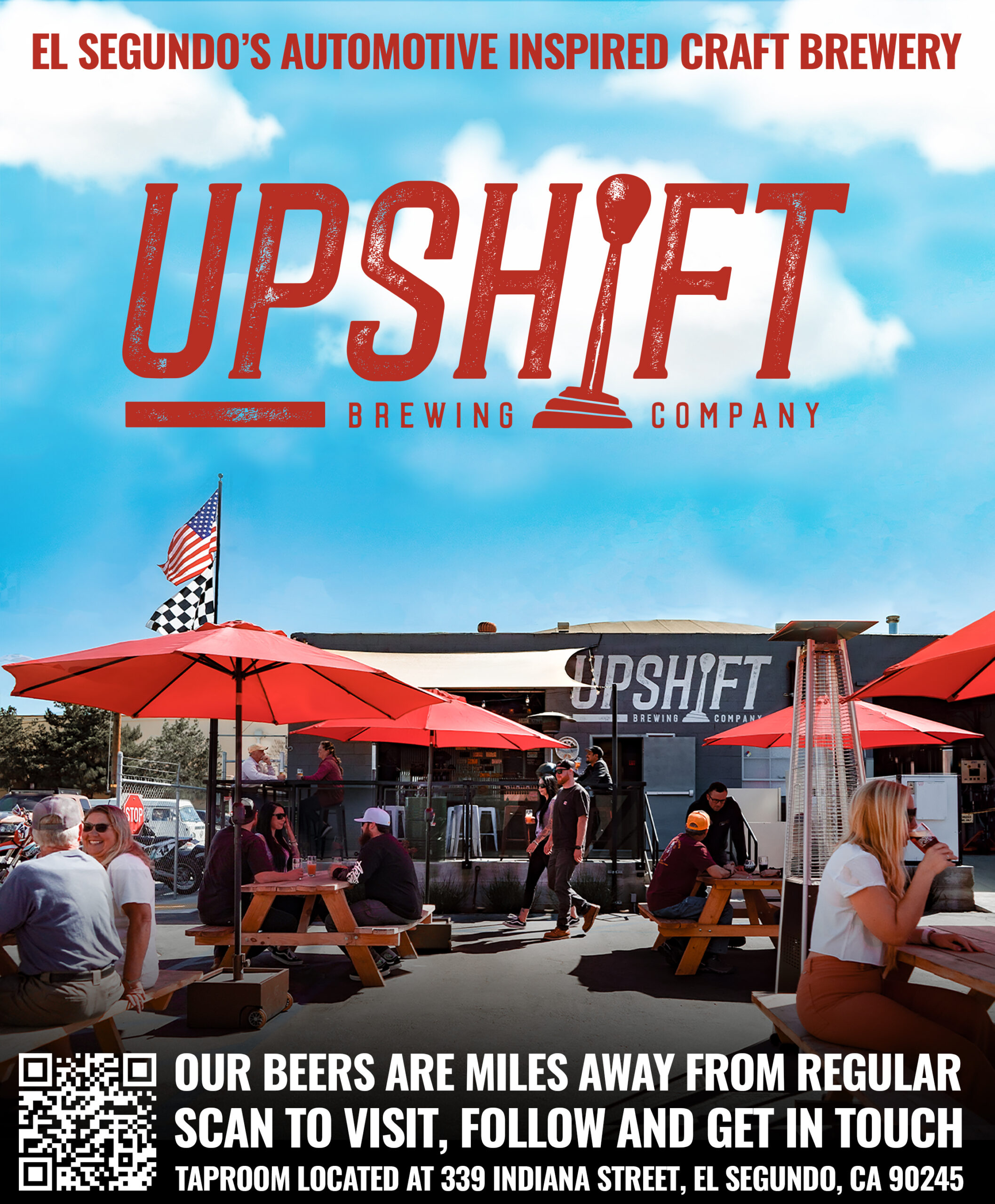Frantastic
Frances Michelle Cannon (née Lopez). Several years ago, I described “Franny,” the much-beloved Executive Director of the Los Angeles Brewers Guild, as a force of nature. She is a virtual (and powerful) one-woman army who advises and represents 95 independent breweries. In the wake of the tumultuous 15-month period which has seen brewery tap rooms closed due to a worldwide pandemic, social unrest that shook our country to its core and now revelations of rampant sexism (and worse) that have rocked the craft beer community, it turns out calling her a force of nature was an understatement on my part.
Franny‘s myriad challenges in helping LA breweries navigate (and even stay afloat) during this seemingly unending shitstorm of cataclysmic events are unimaginable. And yet she remains the rock that anchors a resilient and wonderful “family” of Los Angeles breweries that continue to emerge relatively healthy on the other side of continual chaos.
DRENNON: You are the first ever and only ever Executive Director of the Los Angeles Brewers Guild. How did you get the job?
CANNON: I was very fortunate to have been approached by members of the LABG board back in 2015 about a possible opportunity to become their first Executive Director. I had been employed by a brewery for the last four years but was ready for a change. I was a very active Guild member and handled a lot of the event coordination and marketing for the Guild so it was only a natural progression for me to sign on full-time. The timing couldn’t have been any better. It was not even a full month after my last day at my former job when that company sold to Big Beer and subsequently was no longer qualified to be part of the organization.
DRENNON: When and/or how did you first get into the craft beer scene?
I’ve been involved in the craft beer scene for over a decade. I started covering food and wine (then beer) events for various publications, then signed on with The Full Pint around 2011 as a regular writer and associate editor. I got my first real industry break at Golden Road where I was the social media manager for over three years then immediately moved on to the Los Angeles County Brewers Guild in late 2015.
DRENNON: Where did you grow up and what were you into?
CANNON: I’m an L.A. girl through and through. I was born up in the Bay Area but spent the majority of my life in Los Angeles. Left for college but came back about 11 years ago. I was the only girl in my group of best friends. I was more into climbing trees and going to punk rock shows than learning how to put on makeup. I got really into putting shows and events together in high school and throughout college. Looking back on those years, it’s clear to me that that DIY ethos and desire to cultivate community are what drives me in my career to this day.
DRENNON: How did that shape you into the person you are today which, by the way, is one of the most respected figures in a tight-knit craft community here in the second largest city in the country?
CANNON: Having been raised by a single mom, I learned early on how to be nimble and resourceful. I took those skills with me when I got into the music industry and have built on that foundation in my career today. Personality-wise, I think my no-bullshit attitude resonates with brewers and business-owners alike. We’re all busy and there is no time to waste. Despite having a firm work personality, I’m a big empath, which I feel brings me some balance.
DRENNON: Speaking of your abundant and seemingly endless supply of support to your member breweries, let’s segue into the profound challenges you have faced over the past 15 months. Let’s start with your current issue du jour, the revelations of sexism and worse that have come to light after Brienne Allan, a brewer at Notch Brewing in Salem, Massachusetts, posted her own stories of discrimination on her Rat Magnet Instagram page and asked other women to do the same. What followed was a veritable tidal wave of horror stories that detailed countless instances of sexism, sexual harassment and even abuse from one coast to the other and everywhere in between.
What are your own experiences, and how have you advised your breweries to handle this “crisis?”
CANNON: It’s been emotionally exhausting to deal with everything these last few weeks. Unfortunately, none of this is really new. We see it in every industry at some point, and you could say that the beer industry was overdue in its “reckoning.” I have to acknowledge my privilege. I haven’t had to deal with the terrible behavior or situations my colleagues have, but I am listening, learning, and trying to find every way to help those who haven’t lucked out the way I did. That’s not to say that I haven’t experienced any harassment over the years. There’s always that garden-variety misogyny that all women experience; be it a passive comment or someone undermining you in your role — but the fact that I can even call it “garden-variety” is indicative of how this toxic behavior has been normalized in society to begin with. The fact that I feel “lucky” means that getting respect and being empowered isn’t the norm, and that needs to change.
It’s uncomfortable for people to confront the idea that they may have been complicit. Our brewery members were very shaken up during all of this, and though our Guild was fortunate to not have had to deal with anything super explosive, it was important for all of us to reflect on everything from whether our businesses have the right human resources available including training and protocols to whether there is a culture of open communication and trust. Many have been taking a mental inventory of past experiences to try and identify whether they did enough to address an issue or take it seriously.
DRENNON: What steps do you think the beer industry needs to take to remedy what is clearly a systemic problem?
CANNON: The stigma of communicating openly about these issues needs to go. As a business or employer, it is one thing to have all of the legally mandated trainings and HR resources available. But it is another thing to create a safe and inclusive workplace culture where staff members feel that they can raise issues to management without fear. A recurring issue I have seen with these abuse accusations is that problems reported to management or HR often get overlooked or ignored. Another recurring theme involves victims not feeling comfortable speaking up because they don’t feel like they would be believed. Our industry has a lot of work to do in terms of accountability. I’ve been recommending to brewery members to consider third-party consultants and counselors to help them with addressing workplace issues in a fair and transparent way. Community-wise, it is important for everyone to help keep an eye out for those around them. If you’re at a brewery or an event and you see someone who may be getting harassed or needs help – do your part and speak up!
DRENNON: Another issue that rocked the craft beer industry over last summer (and actually before and since) was the social unrest resulting from the George Floyd murder (and many others) that featured the Black Lives Matter movement rising to national prominence. This challenged breweries with how to show their support and/or respond. How did you navigate that challenge and what advice did you provide to your breweries?
CANNON: Personally, I didn’t see the rise of the Black Lives Matter movement as an industry challenge. If anything, it was just a part of a larger battle cry for justice, equality, and representation. The fact of the matter is, our community represents a wide spectrum of opinions and while many were aligned in wanting to show support behind the movement, there is also a lot of nuance and politics that are difficult to articulate to consumers. I advised our members to be genuine in their support if they felt compelled to participate. There’s nothing that makes me roll my eyes more than performative activism, so I urged those to make meaningful statements and not empty ones; to put their money where their mouths were. I encouraged folks to invest thought into inclusive hiring practices, working with diverse nonprofits, or just lending a platform to the marginalized whenever possible. We’ve seen new partnerships, collaborations, and events born out of this – and that’s a beautiful thing.
DRENNON: Another challenge the entire craft beer industry has faced for many years is the lack of diversity in ownership, brewers, staff and even clientele. What are your suggestions as to how we can improve representation across all of those fronts?
CANNON: This is an issue that we continue to explore. Taking the time to focus on diversity, equity, and inclusion has been top of mind and has been tied to our efforts to protect our work force. But this is also a delicate topic. On one hand, you want to hire the most qualified workers. On the other hand, you want to open opportunities to the under-represented. So how do you accomplish both goals if your candidate pool isn’t reflecting the diversity of our city?
One of my personal goals at the Guild is to create a type of “open house” networking opportunity for folks to learn more about the jobs we have available and identify the path towards getting to those positions. Los Angeles in particular has a significant shortage in brewing talent. Our Guild brewery numbers grow every year, but the number of trained brewery professionals is limited. I’m seeing this lately as our state gets ready to reopen and breweries are hiring back staff. I think in order to boost diversity, we need to invest in training and outreach to really recruit outside of our very small bubble and create development plans for folks who want to eventually move from the hospitality end of the business over to production or the other way around.
DRENNON: I am guessing that even though the aforementioned challenges have been daunting, I would presume the most difficult of them all has been the Covid-19 pandemic. Your breweries essentially had to shut down overnight, pivot to canning and the resulting sales to survive and then cope with the insane see saw of State and LA County health department regulations that had them partially re-opening, face outside and food requirements, deal with hours changing by the week, etc. How did you find the courage, time and wherewithal to help them navigate through the storm?
CANNON: This pandemic has kicked my ass all around this county, but I want to think that we did the best that we could at the Guild to make sure that our members were supported. It was challenging to have to pivot from events and marketing opportunities to focusing on member advocacy, but I did this with the support of our members. The Save LA Brewers campaign to appeal to the Board of Supervisors was a team effort and I am so grateful to our community, the over 30 cities and chambers of commerce who co-signed on our efforts, and the dedication of our supporters who called, wrote, and posted on our behalf. The campaign drew enough support to get the attention of Supervisors Janice Hahn, Kathryn Barger, and Hilda Solis; the majority we needed to move the needle to reopen tap rooms and even get included in a few small business relief grants.
DRENNON: Are you hopeful that in the wake of this incredibly challenging time for the craft beer industry and, in particular, our local independent breweries, that they will emerge stronger, wiser, more diverse and better suited to serve the needs of our eclectic communities in Los Angeles?
CANNON: Absolutely! If there’s one thing I believe in, it’s the fact that our community is resilient and devoted to being better. Change doesn’t happen overnight, and I’m sure we will have dips in our journey, but the fact that L.A. is already a bit ahead of the curve in terms of diversity means we can only go up from here. I take pride in being able to name so many women and people of color in our industry and I’ll be even more thrilled when we continue to add to that list.

